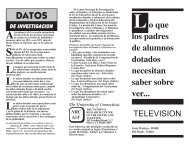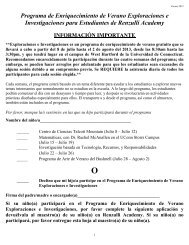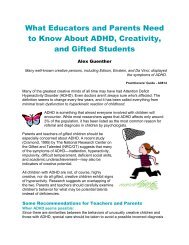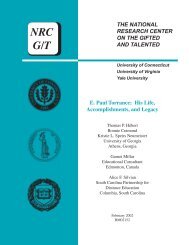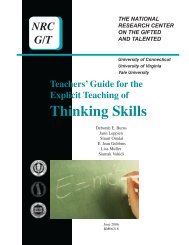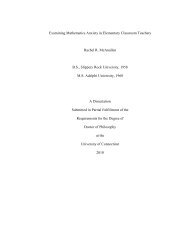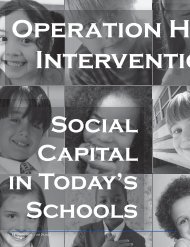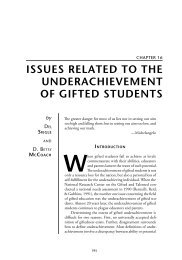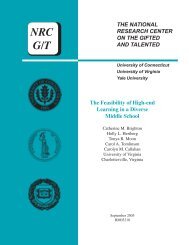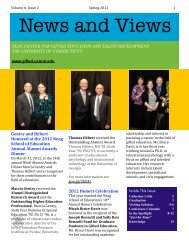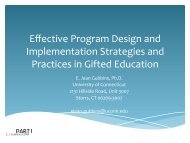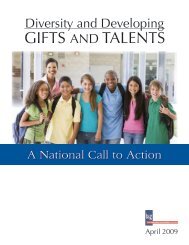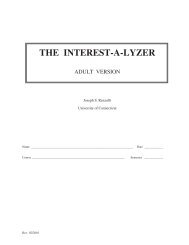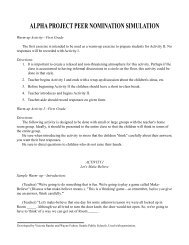Giftedness and High School Dropouts - Neag Center for Gifted ...
Giftedness and High School Dropouts - Neag Center for Gifted ...
Giftedness and High School Dropouts - Neag Center for Gifted ...
You also want an ePaper? Increase the reach of your titles
YUMPU automatically turns print PDFs into web optimized ePapers that Google loves.
13<br />
Table 1<br />
Profiles of <strong>Gifted</strong> <strong>and</strong> Talented Students<br />
Feelings <strong>and</strong> Attitudes<br />
Behaviors<br />
Needs<br />
Adults & Peers<br />
Perceptions of Type<br />
Identification<br />
Home Support<br />
<strong>School</strong> Support<br />
Type I: Successful<br />
Boredom; dependent; positive selfconcept;<br />
anxious; guilty about failure;<br />
extrinsic motivation; responsible <strong>for</strong><br />
others; diminish feelings of self <strong>and</strong><br />
rights to their emotion; self critical<br />
Perfectionist; high achiever; seeks<br />
teacher approval <strong>and</strong> structure; nonrisk<br />
taking; does well academically;<br />
accepts & con<strong>for</strong>ms; dependent<br />
To see deficiencies; to be challenged;<br />
to take risks; assertiveness skills;<br />
autonomy; help with boredom;<br />
appropriate curriculum<br />
Loved by teachers; admired by peers;<br />
loved & accepted by parents<br />
Grade point average; achievement<br />
test; IQ test; teacher nomination<br />
Independence; ownership; freedom to<br />
make choices; time <strong>for</strong> personal<br />
interests; risk taking experiences<br />
Accelerated <strong>and</strong> enriched curriculum;<br />
time <strong>for</strong> personal interests; compacted<br />
learning experiences; opportunities to<br />
be with intellectual peers;<br />
development of independent learning<br />
skills; in-depth studies; mentorships;<br />
college & career counseling<br />
Type IV: <strong>Dropouts</strong><br />
Resentment; angry; depressed;<br />
explosive; poor self-concept;<br />
defensive; burn-out<br />
Has intermittent attendance; doesn't<br />
complete tasks; pursues outside<br />
interests; "spaced out" in class; is self<br />
abusive; isolates self; is creative;<br />
criticizes self & others; does<br />
inconsistent work; is disruptive, acts<br />
out; seems average or below; is<br />
defensive<br />
An individualized program; intense<br />
support; alternatives; counseling;<br />
remedial help with skills<br />
Adults are angry with them; peers are<br />
judgmental; seen as loners, dropouts,<br />
dopers, or air heads; reject them <strong>and</strong><br />
ridicule; seen as dangerous <strong>and</strong><br />
rebellious<br />
Review cumulative folder; interview<br />
earlier teachers; discrepancy between<br />
IQ <strong>and</strong> demonstrated achievement;<br />
incongruities <strong>and</strong> inconsistencies in<br />
per<strong>for</strong>mance; creativity testing; gifted<br />
peer recommendation; demonstrated<br />
per<strong>for</strong>mance in non-school areas<br />
Seek counseling <strong>for</strong> family<br />
Diagnostic testing; group counseling<br />
<strong>for</strong> young students; nontraditional<br />
study skills; in-depth studies;<br />
mentorship; alternative out of<br />
classroom learning experiences;<br />
G.E.D.<br />
Source: Betts, G. T., & Neihart, M. (1988). Profile of the gifted <strong>and</strong> talented, <strong>Gifted</strong> Child Quarterly,<br />
32(2), pp. 250-251.



